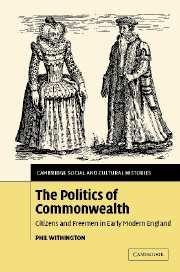Book contents
- Frontmatter
- Contents
- List of figures
- List of tables
- Acknowledgements
- Part I Introductions
- 1 Urbanisation and political culture in early modern England
- 2 The formation of the English corporate system
- Part II Cultural resources: ideology, place, company
- Part III Honest distinctions: economy, patriarchy, religion
- Conclusion
- Bibliography
- Index
1 - Urbanisation and political culture in early modern England
Published online by Cambridge University Press: 23 December 2009
- Frontmatter
- Contents
- List of figures
- List of tables
- Acknowledgements
- Part I Introductions
- 1 Urbanisation and political culture in early modern England
- 2 The formation of the English corporate system
- Part II Cultural resources: ideology, place, company
- Part III Honest distinctions: economy, patriarchy, religion
- Conclusion
- Bibliography
- Index
Summary
Urbanity and urbanisation
The word ‘urbanity … being derived of the Latin word Urbanus’ is ‘not common amongst us’. So wrote Angel Daye in 1586. Until quite recently, historians of early modern England would have probably agreed. The Italian city-states; the free cities of Germany; the imperial and provincial capitals of Spain and France; and the ports and walled towns of the Low Countries: these are traditionally recognised as centres of urbanity in pre-modern Europe. Whether the civic republicanism of Florence, the moral discipline of Geneva, or the thriving commerce of Amsterdam, it was in great continental cities that styles of urban living were fostered and exported. Although there were many English towns, they were regarded as small, provincial, and dominated by other groups and interests – not least the crown, county gentry, and burgeoning metropolis. Moreover, the rich historiography attracted by these towns seemed to establish that, at precisely the moment Daye was writing, whatever urban culture or ‘mentality’ had existed in England was entering a phase of irreparable decline. Exceptions only seemed to prove this more general rule. London by the mid-sixteenth century was a city of international proportions that continued to grow in size, significance, and stature thereafter. Not only was it increasingly populous. It was also socially diverse, culturally fecund, politically significant, and economically integrated into a national economy.
- Type
- Chapter
- Information
- The Politics of CommonwealthCitizens and Freemen in Early Modern England, pp. 3 - 15Publisher: Cambridge University PressPrint publication year: 2005



